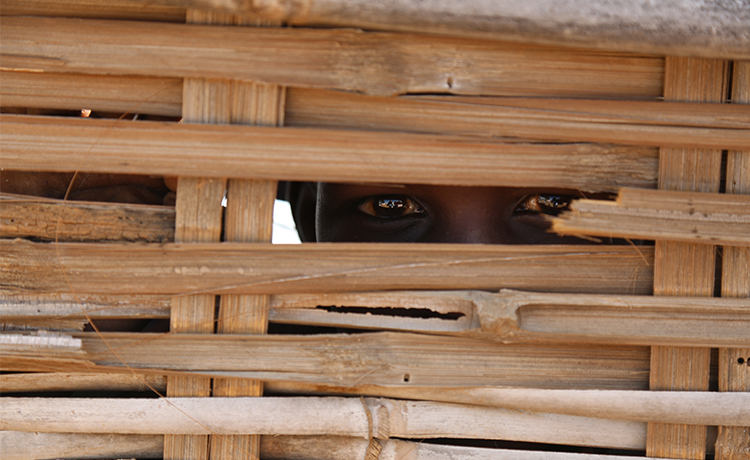News
Sexual violence and severe hunger surge as Sudan war passes one year
- 12 April 2024
News
Sudan – “I can’t forget that moment. I can’t forget his smell. I can’t forget their faces. This moment will haunt me until I die.”
Fawzya*, 26, was travelling towards the border with Chad to escape the violence that had engulfed her hometown in Sudan, when fighting broke out just in front of her. After a year of war and roiling insecurity, Sudan is experiencing the world's largest internal displacement emergencies, with some 6.6 million people forced to flee their homes to other areas of the country.
“I had to run and lost my aunt,” she told UNFPA, the United Nations sexual and reproductive health agency. “A family offered me shelter but after three hours armed men stormed in. ‘Where do you hide the weapons?’ they shouted.”
Fawzya and the family weren’t armed, but the owner of the house was shot anyway – right in front of them. “The men told me to go to the next room and bring them something to eat”, she continued. “I left and three of them came in after me and locked the door. One pointed a gun at my head and told me to take off my clothes. When I refused he shot a bullet into the roof. I was so scared.” She was forced to the floor and raped.
“I was vomiting and crying. A woman came to the room after they left, covered me and started crying with me.”
Fawzya’s experience is among an untold number of reports of harrowing sexual violence in Sudan, including rapes, kidnappings, and forced and child marriages. As a staggering 6.7 million people need gender-based violence protection, the crisis has instilled terror for people with barely any recourse to health services, support or justice.
A multiplying crisis
The sexual violence wielded as a weapon of war is indiscriminate of age and devoid of mercy. Millions are being pushed towards catastrophic levels of hunger, and attackers are using desperation to their advantage.
“We ran out of food after hiding for a month,” said 14-year-old Sarah*. “I went out with my sister to search for something to eat – three armed men found us. My sister managed to escape, but they raped me. I passed out for hours. When I woke up I found some older ladies who recognized me and took me to my mother.”
Kidnappings have also soared in conflict-hit areas: For 22-year-old Shakra*, an evening at her friend’s house quickly spiralled into a nightmare. “Four men forced me into a car and drove for two hours,” she told UNFPA. “They raped me and left me there for two days without water or food. Afterwards, I found people from my tribe and asked them to take me to my family.”

Perils for pregnant women
The health-care system in Sudan has not been spared – close to 80 per cent of hospitals in conflict-affected areas are no longer functioning due to shortages of supplies and staff who are themselves displaced. The facilities that remain operational are overwhelmed by people seeking care, bringing the system to its knees.
Amid this catastrophe, 150,000 women are displaced and pregnant. “None of us has stable work or resources to meet our needs, such as medical treatment,” said Amina*, who has been displaced from Khartoum. “We rely on free services provided by mobile clinics that visit our gathering site.”
The clinics are part of UNFPA’s support to reach some of the people in the most remote areas, delivering supplies and critical maternal health services, including emergency obstetric care and clinical management of rape. A total of 33 mobile units have been deployed across the country so far, and 64 safe spaces have been set up to offer protection, treatment and specialist referrals for survivors of gender-based violence.
Most women and girls in areas affected by conflict have no access to the reproductive health services they sorely need. “One woman suffering from pregnancy complications had to be carried on a donkey cart for 10 kilometres,” said Zainab, a midwife working with a UNFPA mobile team in Aj Jazeera State.
The volatile situation means medical staff often cannot return home after their shift has finished. “I leave for three days at a time, attending birth after birth,” said Fatima, a midwife in Khartoum. “I go back home on the fourth day just to rest. Then I start again."
A UNFPA-supported lifeline
In Darfur, Khartoum and Kordofan – areas that have witnessed some of the heaviest fighting – the lives of more than 7,000 new mothers will be at severe risk if they don’t get the health and nutritional support they need. Some 1.2 million pregnant and breastfeeding women will likely suffer from acute malnutrition over the coming months, greatly increasing the risk of illness and death for both mothers and newborns.
UNFPA is working with partners to provide life-saving reproductive health and protection services, especially in areas with high numbers of internally displaced people. In the last year, more than 100,000 people have been reached with reproductive health and medical services and more than 600,000 with gender-based violence response.
“They offered us a lifeline,” Amina* said.
“The feeling that there is someone who cares about you, especially as a displaced person, means so much,” said Samia, from East Khartoum, currently receiving help at a UNFPA-supported safe space.
*Names changed for privacy and protection